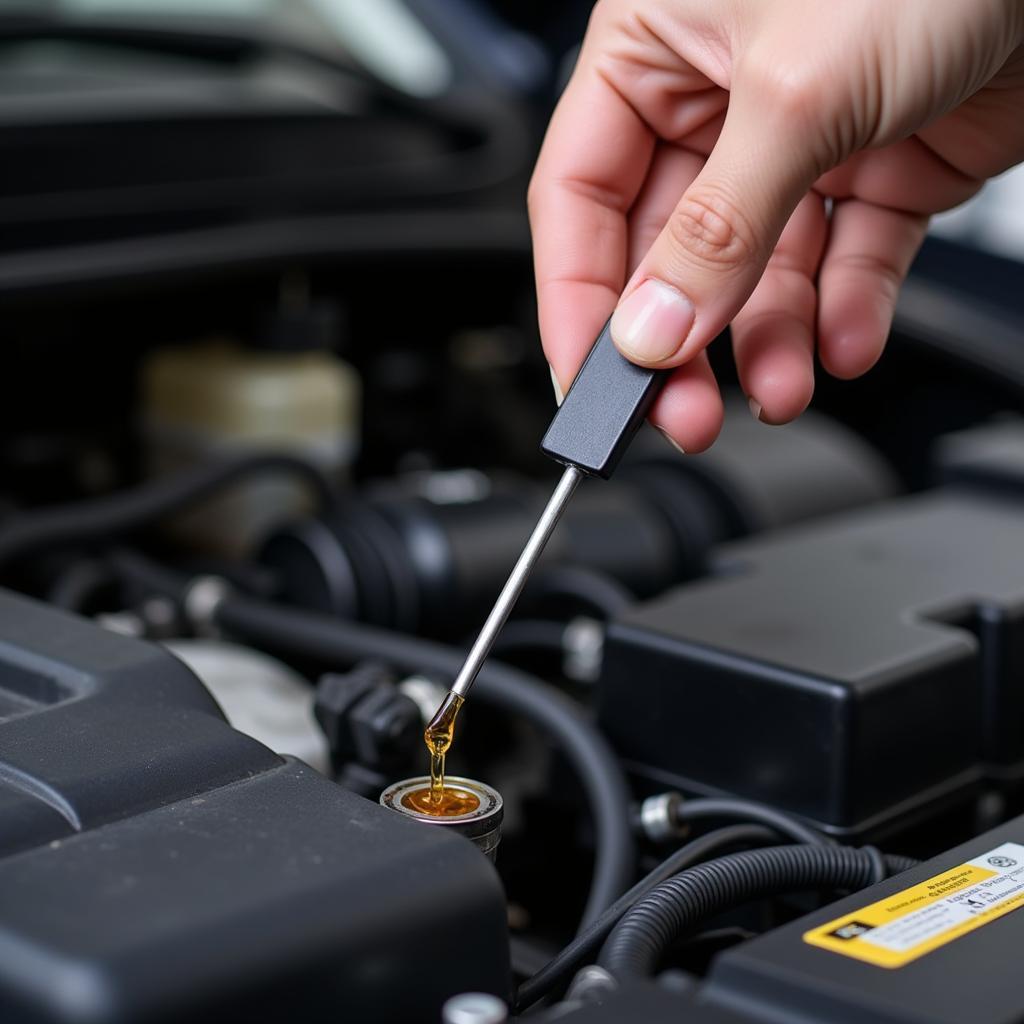A car service checklist is your comprehensive guide to keeping your vehicle running smoothly and safely. It outlines all the essential checks, inspections, and maintenance tasks that should be performed at different service intervals. Whether you’re preparing for a routine oil change or a major service milestone, understanding what’s included in a car service checklist can save you time, money, and potential headaches down the road.
Deciphering Your Car Service Checklist
A typical car service checklist goes beyond just changing the oil. It’s a multi-point inspection covering various components, ensuring your vehicle operates at peak performance and remains safe to drive. Here’s a breakdown of what a standard car service checklist might include:
Engine and Fluids:
- Oil Change: This involves draining the old engine oil and replacing it with fresh oil, along with a new oil filter. Regular oil changes are crucial for lubricating engine parts, reducing friction, and preventing premature wear.
- Fluid Level Checks and Top-ups: This includes checking and topping up essential fluids like coolant, brake fluid, power steering fluid, transmission fluid, and windshield washer fluid. Maintaining proper fluid levels is vital for the smooth operation of various vehicle systems.
 Mechanic Checking Engine Oil
Mechanic Checking Engine Oil
Brakes:
- Brake Pad/Shoe Inspection: The thickness of your brake pads or shoes is measured to determine their remaining lifespan. Worn-out brake pads can significantly reduce braking efficiency and pose a safety risk.
- Brake Disc/Drum Inspection: The brake discs or drums are examined for signs of wear, scoring, or damage.
- Brake Fluid Test: The condition of your brake fluid is assessed for its boiling point and moisture content, which can affect braking performance.
Tyres:
- Tyre Pressure Check: Ensuring your tires are inflated to the correct pressure (specified in your car’s manual) is crucial for optimal fuel efficiency, tire wear, and handling.
- Tyre Tread Depth Measurement: The depth of the tread grooves is measured to assess tire wear and ensure sufficient grip on the road, especially in wet conditions.
- Tyre Condition Inspection: Your tires are inspected for any cuts, bulges, cracks, or uneven wear patterns, which could indicate potential problems.
- Wheel Alignment Check: This verifies that your wheels are aligned according to the manufacturer’s specifications, ensuring your car drives straight and true.
Lights and Electrical:
- Headlights, Tail lights, Brake Lights, and Turn Signals: All exterior lights are checked to ensure they are functioning correctly for visibility and safety.
- Battery Test: The battery’s voltage and cold cranking amps (CCA) are tested to assess its health and charge capacity.
Other Essential Checks:
- Air Filter Inspection: The air filter is checked for dirt and debris and replaced if necessary. A clean air filter ensures optimal airflow to the engine for efficient combustion.
- Cabin Air Filter Inspection: The cabin air filter, responsible for filtering the air inside your car, is inspected and replaced if needed.
- Exhaust System Inspection: The exhaust system, including the muffler and exhaust pipe, is inspected for leaks, damage, or corrosion.
- Steering and Suspension Components: These parts are checked for wear and tear to ensure smooth handling and a comfortable ride.
- Drive Belts Inspection: The drive belts, responsible for powering various engine accessories, are examined for cracks, fraying, or looseness.
Why is a Car Service Checklist Important?
Regularly following a car service checklist offers numerous benefits:
- Increased Safety: By addressing potential issues early on, you can significantly enhance the safety of your vehicle for yourself and your passengers.
- Improved Performance: Well-maintained vehicles tend to perform better, offering smoother acceleration, braking, and overall handling.
- Extended Lifespan of Your Car: Regular servicing can help prevent major problems down the line, extending the lifespan of your vehicle.
- Fuel Efficiency: Keeping your car well-maintained can contribute to better fuel economy, saving you money on gas.
- Higher Resale Value: A well-documented service history can increase the resale value of your car when it’s time to sell or trade it in.
Car Service Intervals: How Often Should You Get Your Car Serviced?
The frequency of car servicing depends on several factors, including the make and model of your car, your driving habits, and the manufacturer’s recommendations. As a general rule of thumb:
- Refer to Your Owner’s Manual: This is your go-to guide for service intervals specific to your vehicle model.
- Standard Service Intervals: Many manufacturers recommend a minor service every 6 months or 10,000 kilometers and a major service every 12 months or 20,000 kilometers.
- Driving Conditions: If you frequently drive in harsh conditions, such as extreme temperatures, dusty environments, or heavy traffic, you might need to service your car more often.
Navigating Your Car Service Options:
- Dealerships: Dealerships specialize in your car’s make and have access to specialized tools and technicians.
- Independent Garages: Reputable independent garages can offer competitive pricing and personalized service.
- Car Service Chains: These provide convenience and often have standardized pricing.
When choosing a service provider, consider factors like reputation, experience, certifications, and customer reviews.
Conclusion:
Understanding what a car service checklist entails empowers you to take proactive steps towards maintaining your vehicle’s health, safety, and performance. By adhering to regular service intervals and addressing potential issues promptly, you can enjoy a smoother, safer, and potentially more cost-effective driving experience for years to come.
Need to know more about how often you should service your car? Check out our article: [when do you need to service your car](https://carserviceo.com/when-do you-need-to-service-your-car/).

